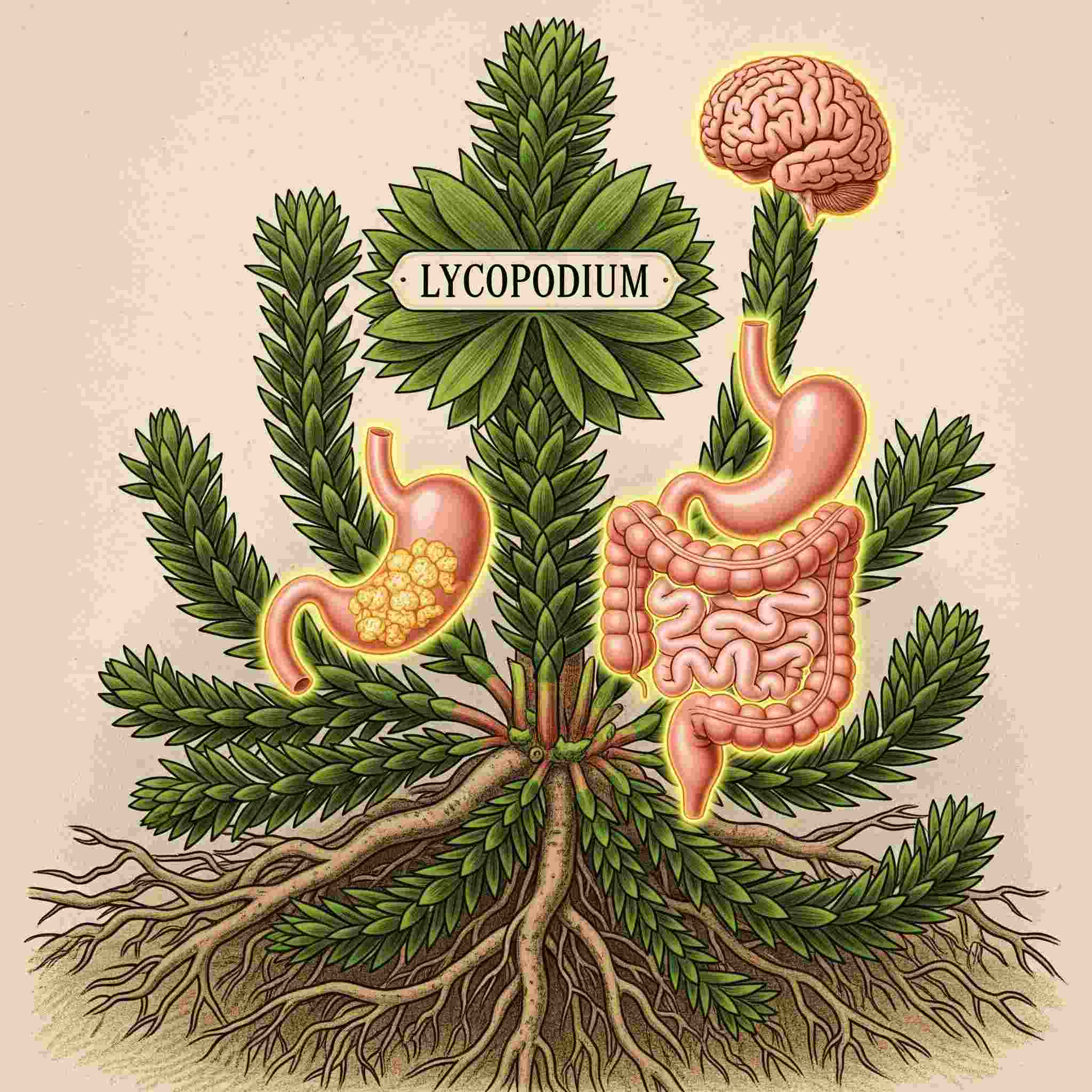Depression, Hopelessness, Despair and Sadness

Depression, Hopelessness, Despair and Sadness
Arranged and presented by: Khalid Mahmood Awan
Homeopathy approaches health conditions in an individualized way. You can explore homeopathic treatment by disease to understand how different conditions are managed naturally.
The Lycopodium patient is sad and lacks self-confidence. They have a good ability to understand things (intelligent). They consider themselves sick and feel like they are in two places at once. Crying and laughing alternate. They cannot gather their thoughts.
Key characteristics:
- Sadness and lack of self-confidence
- Intelligent, but considers themselves sick
- Feeling of being in two places at once
- Alternating crying and laughing
- Difficulty concentrating thoughts
Lilium tigrinum
The Lilium tigrinum patient is fearful of having incurable organic diseases. They are restless to do purposeless tasks. They curse, go on strike, and think about obscene matters. There is deep spiritual sadness. Suggestions or consolation increase their troubles. The patient is active.
Natrum muriaticum
Natrum muriaticum diseases arise from psychological issues like grief, fear, anger, etc. The patient dislikes sympathy, is irritable and wants to be alone, crying for it. There are tears with laughter, and suppressed emotions.
Medorrhinum
Time passes very slowly for the Medorrhinum patient. They fear going insane. Cannot speak without crying. Depression with suicidal thoughts.
Nux vomica
The Nux vomica patient is anxious, cannot tolerate noise and light. Irritable, angry, dislikes being touched. Time passes slowly. Inclined to criticize others, angry, fault-finding.
Phosphorus
Phosphorus has sexual mania. The patient considers themselves very important. When alone, they think they will die. Restless and anxious.
The passage goes on to describe several other homeopathic remedies and their characteristic mental and emotional symptoms. Overall, it provides a brief overview of the psychological profiles associated with different homeopathic medicines used to treat various mental and emotional conditions.
Apis mellifica
Apis mellifica is indicated for feelings of despair, anger, and lack of confidence in doing or saying something that arise from hopelessness. However, if there is an ability to scream and shout with these causes. Due to depression symptoms, the patient needs someone to be with them constantly. If the patient lacks thirst and has water-like bags under the eyes, Apis mellifica can help cure them.
Argentum nitricum
The Argentum nitricum patient thinks they will surely fail. Fearful and nervous, they have an urge to jump out of windows without thinking. Semi-unconsciousness and trembling, melancholia, fearful of severe illnesses, weak memory affecting creative abilities. The patient starts making irrational arguments. Time passes slowly, decreased understanding, anxious state making them rush every task. Fears, anxieties and unfounded hidden motivations compelling action.
The Argentum nitricum patient suffers from delusions, various fears. Sees imaginary spectres. Even if not seeing spectres, feels something is present around them. Afraid of going to certain places. Afraid of looking down from heights lest they jump. Avoids going to high places. Very afraid of looking up at tall buildings from below. Afraid of going into halls with high ceilings, fearing the ceiling may fall on them. Afraid of crossing bridges, fearing they may jump into the river. In fact, feels an urge to jump. Trembles with fear and feels weakness. Afraid of closed and narrow spaces. Diarrhea starts before exams or important meetings. Some people become anxious and very angry in such states. Loses memory. If memory loss is permanent, Alumina is the remedy if used for some time.
These were the mental symptoms. Physical symptoms include weakness of heart with tendency to blueness. Persistent eye irritation, with pus-like discharge, pain and feeling of tiredness in eyes. Stomach pain at start of menses, ulcers on cervix that bleed. Menses restart 1-2 weeks after ending but less in quantity. Tendency of bleeding from chronic stomach ulcers. Craving for sweets with gas and tension in abdomen. Feeling of splinter stuck in throat like in Hepar sulph. Has frightening dreams. Also has paralysis of lower trunk. Troubles increase after eating. Cold air and cold weather reduce troubles.
Arsenicum album
Arsenicum album patients have mental and physical symptoms. Mental symptoms include mental restlessness, suspicion, impatience, irritability, sadness, hopelessness and depression. These patients are among the most difficult. They are argumentative critics, get angry without reason, fearful, feel insecure, forgetful, very sensitive to pain and often suffer from delirium and delusions (false beliefs). They feel their troubles more intensely than they actually are. Afraid of being alone.
Mental restlessness is most prominent in Arsenicum album. If the restlessness is physical, Rhus tox is the remedy. They have fear of death. The patient thinks something is going to happen. The patient is delicate and refined, cannot even tolerate wrinkles on clothes. Discharges are extremely foul-smelling and putrid. Dysentery and diarrhea are blackish, frequent small stools. Intestinal peristalsis is affected. Toxic substances that normally get expelled start getting absorbed in the body. Those toxic substances create restlessness. Frequent thirst in the patient is a manifestation of this restlessness. Craving for small sips of water frequently. In women, uterine diseases transform into mental diseases.
If menstrual issues are cured by some medicine but restlessness, delusions, fear of death and insanity symptoms appear, it’s not a good sign. If such a female patient has other accompanying symptoms, Arsenicum album can be curative. The restlessness of Arsenicum album sometimes transforms into insanity. Suicidal tendencies develop. The patient becomes obsessed with the delusion that the time for their forgiveness has passed.
Physical symptoms of Arsenicum album include burning, offensive odors and watery discharges, rapid heartbeat, profuse sour sweating. Tip of tongue is red, tendency of bleeding from any part of body. Vomiting of blood, bleeding from lungs and bleeding from mucous membranes is rarely found. The nature of symptom aggravation in Arsenicum album varies – some symptoms worsen at 2 AM after sleeping at night, some worsen on waking in the morning, and some worsen after lunch.
Baryta muriatica
The Baryta muriatica patient becomes angry without reason. They experience anxiety about the future and in the evening, accompanied by nausea, stomach pressure, and vomiting. It’s very useful for children who are weak in learning and understanding. They don’t desire to play with other children. Unable to concentrate. The surrounding environment seems strange, they change it, delusion that they’re walking on their knees. Mentally dull. The female patient thinks she’s dying. Fear of evil powers, fear of men. Foolish behavior, obsession, does foolish acts, insanity due to conflicts, insanity due to strong sexual emotions. Baryta muriatica has maddening increased sexual desire. Due to this madness, they grab the opposite sex in the market or street. Tension due to unusual sexual excitement in women and men. All kinds of mania resulting from increased sexual desire. Indecisive. Irritability in the evening. Increased sexual desire in women. Sadness in the morning. Sits quietly. Children sit in a corner and give confused answers. Easily frightened, suspicious, unable to speak, sleep-talking, unconsciousness, fainting, dizziness while walking, things spin around. In Baryta muriatica, white particles are found increased.
Causticum
For mental patients who lack confidence in doing or saying something, but have emotions. Those thoughts and emotions trouble them. Anxiety and other problems arising from sadness, hopelessness. For the distress caused by these, Causticum is the best medicine.
Cimicifuga
In Cimicifuga, there’s a feeling of being surrounded by clouds. Severe depression, dreams that some evil is coming. Afraid of traveling in closed vehicles, feels better jumping out. Constantly talkative, sees rats in imaginary scenes, in severe delirium tries to hurt herself. Mania appears when neuralgic pains disappear. When the patient is better, they are talkative and enthusiastic. When depressed, they are restless and sad. With increased fear. Headache involving the neck during painful menstruation is a very important symptom. An important point to remember in Cimicifuga: joint pains are fundamental in the female patient. Besides this, mental state includes irritability, weakness, depression, and sadness certainly found, mental symptom of feeling like going insane. Severe headache with uterine symptoms. There’s anxiety, neuralgic pains, and very sensitive nerves. Girls who are very delicate and sensitive. Indifferent to the world, lost in themselves, if called forcefully they start crying, Cimicifuga is their medicine. At this time, this medicine proves to be a blessing. Delicate women who develop menstrual problems, joint pains, and other complications due to shock. Fear and delusion that someone might poison them, so they don’t even take medicine. Their troubles increase in the morning and with cold, except for headache which is relieved by heat and eating.
Gelsemium
The patient has no desire to talk to anyone. Easily angered, indecisive, unable to concentrate on anything. If such a mental patient has a lack of thirst, Gelsemium is the medicine.
Hyoscyamus niger
Hyoscyamus niger affects the nerves, especially sexual nerves. The entire nervous system becomes chaotic. The patient feels their brain has been taken over by an unusual power. Talks deliriously, acts like a madman. Due to inflammation of sexual organs, says dirty, shameful things. Even a respectable person says obscene things during illness. Muscles twitch, as if flames are leaping, then convulsive state develops. Pricking, as if stitched with a needle. Convulsions and stiffness, jerks, sometimes nerves twitch. Weakness to the extent that the head slides down from the pillow (like Muriatic acid). So weak as if strength is being stripped away. The patient is delusional. They think someone is standing near them. Talks to imaginary beings. Keeps turning back to look if someone is standing behind them. Suspicious temperament like Lachesis. Thinks a close relative has mixed poison in their medicine. Screams in semi-consciousness then faints. Talks to self during illness. Delusions take root. Thinks the time for forgiveness has passed, now they will never be forgiven. An imaginary crime takes over the mind, that they have murdered someone or committed some horrible crime. This is just a delusion. The patient forgets where they are while walking. At home, thinks they’re not at home, feeling of unfamiliarity. Starts fearing water. The sound of flowing water creates excitement in temperament. Spasm in throat preventing even water from going down. Hysterical state develops before menstruation. Epileptic fits occur while sleeping at night. The patient’s symptoms increase at night while sleeping, after eating, and from lying down. Afraid of solitude. Symptoms decrease from bending. Every muscle in the body, from eyes to nails, is found to bend. Has a dry cough that increases when lying down and improves when sitting up (Drosera). Especially in old people. Also useful in pneumonia.
Ignatia
- Used successfully for grief, like other remedies
- Helps forget recent grief, accidents, or loss of loved ones
- Creates desire to live and enjoy life again
- Patient is extremely sensitive
- Changeable mood, prefers high standards
- Symptoms include heaviness in breathing during distress
- Introverted, quiet, thoughtful, melancholic, sad
- Unable to share thoughts with others
- Sensitive, polite, delicate emotions in female patients
- May develop heart and mental issues due to sorrows
- Sometimes has hysteria attacks
- Lacks ability to express pain or cry out despite suffering
- Internalizes anger rather than expressing it
- Headaches from insulting behavior
- Helpful for recent grief from death of a loved one
- For older griefs affecting physical functions, Silicea, Ambra grisea or Natrum mur are used
- Nervous patients may tremble, feel tingling, faint
- Throat issues improve with swallowing
- Lying on painful side brings relief
- Cough worsens with coughing
- Hopeless, depressed, avoids meeting people
- Weak memory, delusional, hysterical
- Effective for recent grief, not for developed insanity
- May feel unforgivably sinful
- Desires cold water despite having a cold body
- Aversion to regular food
- Feels calm with rest
- Visual disturbances like spots and zigzag lines
- Sour taste in mouth, untimely thirst
- Talks nonsense in arguments
- Sleep disturbances
- Menstrual issues from grief
- Symptoms worse in morning and open air, better while eating, resting or changing position
Phosphoric acid
- For patients experiencing fatigue from hopelessness and intense emotions
- Decreased interest in surroundings they previously enjoyed
Pulsatilla
- Mental and physical symptoms alternate
- Patient is mild-tempered, tearful, cowardly
- Often called a “woman’s remedy”
- Cries easily, sensitive, reacts strongly when ego is hurt
- Delusional, irritable, feels disrespected
- Non-violent, discouraged, religious mania
- Suppresses angry feelings
- Top remedy for women’s specific illnesses
- Key characteristics: gentleness, submissiveness, tearfulness
- Strong effect on female reproductive organs
- Helps with menstrual pain and flow issues
- Lymphatic system involvement
- Thirstlessness, better in open cool air
- Extremely fearful of opposite sex
- Dry mouth without thirst, constantly clearing throat and moistening lips
Sepia
- Primarily used for women
- Loss of natural sexual inclination and loving feelings
- Mother may suddenly lose maternal feelings
- Indifferent towards husband
- Shrinking social circle
- Suicidal tendencies may develop
- Can become semi-insane from long-term suppressed suffering
- Feels internally broken, becomes averse to everything
- May hate things they should like
- Fearful
- Best for women with dark brown hair
- Feeling of heaviness in internal organs
- One of the best remedies for uterine issues
- Useful for TB-prone women with chronic liver and uterine symptoms
- Pelvic organs feel loose with downward pressure
- Yellow-greenish leucorrhea with intense itching
- Irregular, scanty menses with cramping pains
- Prolapsed uterus and vagina
- Morning nausea
- Primarily affects venous system and liver
- Tendency for miscarriage
- Hot flashes with weakness and sweating during menstruation
- Feels cold even in warm rooms
Sulphur
- Careless, disorderly habits
- Aversion to bathing
- Dirty, smelly
- Contradictory nature – sensitive to others’ smells but oblivious to own
- Symptoms return when lying in bed and body warms up
- Warm-natured
- Philosophical inclinations
- Lazy, difficulty concentrating
- Weak memory
- Very warm-blooded
- Nervous, thin, stooped posture
- Distinctive appearance – unkempt hair, old-fashioned clothes
- Symptoms worsen at noon and midnight
- Stubborn in opinions
- Anxious in various ways
- Can’t tolerate criticism or domination
- Absent-minded, impractical
- Attracted to opposite sex, often womanizers
- Emotionally dependent on wives despite appearances
- Like showing off, self-confident
- Naturally intelligent
- Protective of family
- Worried about future
- Prone to putrid diseases, skin conditions
- Burning sensations in various parts
- Morning hunger absent
- Night sweats
- Severe putrid fevers
- Joint pains
- Morning diarrhea
- Visual disturbances
- Bad smell from nose
- Useful as cholera preventative
- Helpful for prostate issues when combined with Thuja
- Beneficial for male/female weaknesses and female infertility


